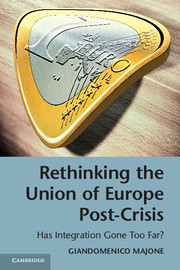Book contents
- Frontmatter
- Contents
- List of abbreviations
- Introduction: varieties of regional integration
- 1 Monetary union as a metaphor
- 2 A political culture of total optimism: its rise and fall
- 3 Integration and its modes
- 4 Deepening integration: transaction costs and socio-political limits
- 5 European integration and the decoupling of politics and economics
- 6 From the democratic deficit to a democratic default? The normative dimension of the euro crisis
- 7 ‘More Europe’
- 8 The limits of leaderless Europe
- 9 Integration through cooperative competition
- 10 The nation state between globalization and regional integration
- Bibliography
- Index
8 - The limits of leaderless Europe
Published online by Cambridge University Press: 05 May 2014
- Frontmatter
- Contents
- List of abbreviations
- Introduction: varieties of regional integration
- 1 Monetary union as a metaphor
- 2 A political culture of total optimism: its rise and fall
- 3 Integration and its modes
- 4 Deepening integration: transaction costs and socio-political limits
- 5 European integration and the decoupling of politics and economics
- 6 From the democratic deficit to a democratic default? The normative dimension of the euro crisis
- 7 ‘More Europe’
- 8 The limits of leaderless Europe
- 9 Integration through cooperative competition
- 10 The nation state between globalization and regional integration
- Bibliography
- Index
Summary
The principle of equality in the EU
A key element of the ideology of European integration is the basic equality and equal dignity of all the member states, from the smallest to the largest: no leader but a ‘collective leadership’ as the principle of equality of all member states has sometimes been characterized. This principle of formal and (to the extent possible) substantive equality has inspired all the European treaties and also the day-to-day practice. It is reflected in the design and modus operandi of the European institutions. Indeed an important, if tacit, responsibility of the Commission is to ensure that the interests of the smaller member states are sufficiently taken into consideration – which explains why the smaller countries have always been the strongest supporters of the supranational executive. Clear evidence of the importance these member states attach to membership in the Commission is the promise made by the European Council after the failure of the first Irish referendum on the Lisbon Treaty (in June 2008) to abandon the planned reduction of the number of Commissioners – a promise meant to facilitate the success of the second referendum. The price of the concession is not negligible, however: as Piris (2011) points out, a Commission with twenty-seven, or more, members is hardly capable of taking decisions.
A direct consequence of the principle of equality is the fact that nobody can claim to govern the Union and, as a corollary, the absence of the traditional government–opposition dialectic. The European Commission, which many Euro-enthusiasts used to see as the would-be kernel of the future government of a politically united Europe, in fact looks more and more like an international bureaucracy and less and less like a proto-government. Even the European Council – the most likely candidate to provide leadership at the supranational level – is only able to achieve what the member states want it to achieve, with agreements hammered out – often bilaterally – beyond its walls (Peterson and Shackleton 2012). There are good reasons to believe that, short of a radical transformation, political leadership will always be an extremely scarce commodity in the EU. The belief in the equality of all the member states and in unanimity as the optimal decision rule, at least in the case of politically sensitive decisions, has deep ideological roots.
- Type
- Chapter
- Information
- Rethinking the Union of Europe Post-CrisisHas Integration Gone Too Far?, pp. 236 - 265Publisher: Cambridge University PressPrint publication year: 2014

